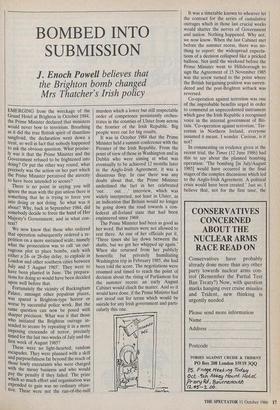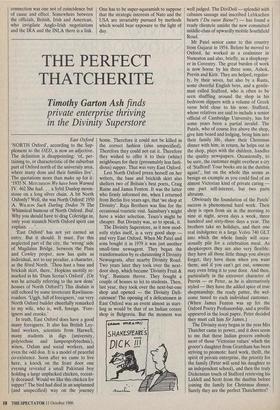BOMBED INTO SUBMISSION
J. Enoch Powell believes that
the Brighton bomb changed Mrs Thatcher's Irish policy
EMERGING from the wreckage of the Grand Hotel at Brighton in October 1984, the Prime Minister declared that ministers would never bow to terrorism. Breathing as it did the true British spirit of dauntless sangfroid, the declaration went down a treat, so well in fact that nobody happened to ask the obvious question. What precise- ly was it that the Prime Minister and the Government refused to be frightened into doing? Or put the other way round, what precisely was the action on her part which the Prime Minister perceived the atrocity to have been intended to secure?
There is no point in saying you will ignore the man with the gun unless there is something that he is trying to force you into doing or not doing. So what was it about? Why, back in September 1984, did somebody decide to force the hand of Her Majesty's Government, and in what con- text?
We now know that those who ordered that operation subsequently ordered a re- petition on a more sustained scale, namely what the prosecution was to call 'an out- rageous plot to place bombs, each with either a 24- or 28-day delay, to explode in London and other southern cities between July and 5 August 1985'. They were to have been planted in June. The prepara- tions for doing so would have been decided upon well before that.
Fortunately the vicinity of Buckingham Palace, amongst other populous places, was spared a Brighton-type horror or worse by successful police work. But the same question can now be posed with sharper precision. What was it that those who initiated the Brighton outrage in- tended to secure by repeating it in a more imposing crescendo of terror, precisely timed for the last two weeks of July and the first week of August 1985? These were no light-hearted, random escapades. They were planned with a skill and purposefulness far beyond the reach of those lowly executants who were charged with the messy business and who would pay the penalty if they failed. The prize which so much effort and organisation was expended to gain was no ordinary objec- tive. These were not the run-of-the-mill murders which a lower but still respectable order of competence persistently orches- trates in the counties of Ulster from across the frontier of the Irish Republic. Big people were out for big results. It was in October 1984 that the Prime Minister held a summit conference with the Premier of the Irish Republic. From the point of view of those in Washington and in Dublin who were aiming at what was eventually to be achieved 12 months later in the Anglo-Irish Agreement, it was a disastrous flop. In case there was any doubt about that, the Prime Minister underlined the fact in her celebrated `out. . . out. . . interview, which was widely interpreted, not least in Ulster, as an indication that Britain would no longer be going down the road towards a con- federal all-Ireland state that had been engineered since 1969. The Prime Minister had been as good as her word. But matters were not allowed to rest there. As one of her officials put it, `Three times she lay down between the shafts, but we got her whipped up again.' When she returned from her publicly honorific but privately humiliating Washington trip in February 1985, she had been told the score. The negotiations were resumed and timed to reach the point of decision about the rising of Parliament for the summer recess: an early August Cabinet would clinch the matter. And so it would have done, if the Prime Minister had not stood out for terms which would be suicide for any Irish government and parti- cularly this one. It was a timetable known to whoever let the contract for the series of cumulative outrages which in those last crucial weeks would shatter the nerves of Government and nation. Nothing happened. Why not, we now know. When the last Cabinet met before the summer recess, there was no- thing to report: the widespread expecta- tions of a decision collapsed like a pricked balloon. Not until the weekend before the Prime Minister went to Hillsborough to sign the Agreement of 15 November 1985 was the screw turned to the point where the British bargaining position was surren- dered and the post-Brighton setback was reversed.
Co-operation against terrorism was one of the improbable benefits urged in order to commend an unprecedented instrument which gave the Irish Republic a recognised voice in the internal government of Bri- tain. 'Co-operation against terrorism.' Ter- rorism in Northern Ireland, everyone assumed it meant. I wonder. Curious, is it not?
In commenting on evidence given at the recent trial, the Times (12 June 1986) had this to say about the planned bombing operation: 'The bombing [in July/August 1985] would have occurred in the final stages of the complex discussions which led to the Anglo-Irish Agreement. A political crisis would have been created.' Just so. I believe that, not for the first time, the connection was one not of coincidence but of cause and effect. Somewhere between the officials, British, Irish and American, who invigilate Anglo-Irish negotiations and the IRA and the INLA there is a link. One has to be super-squeamish to suppose that the strategic interests of Nato and the USA are invariably pursued by methods which would bear exposure to the light of day.



























































 Previous page
Previous page